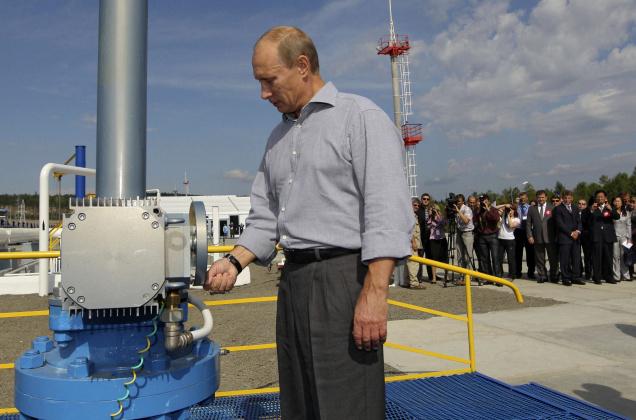
Putin’s Energy Games Turn Increasingly Erratic
Publication: Eurasia Daily Monitor Volume: 8 Issue: 60
By:

As the US, French and British airstrikes are maintained on Libya, the recent major question about Russia’s reliability as energy supplier for Europe is becoming smaller. Prime Minister, Vladimir Putin, has no sympathy for the rebels that dare to challenge the legitimacy of irreplaceable rulers, but he is perfectly aware that the emergence of the “arc of revolutions” from Morocco to Bahrain changes the key fundamentals on the oil-and-gas market. The rise of oil prices always comes in useful and is very welcome in election year, but the end of buyers’ domination on the European gas market is of even greater potential significance. Quite possibly, it was the intention to accentuate this gas repositioning that motivated Putin’s criticism of a Western “crusade” against Libya, but President Dmitry Medvedev had to cut this discourse short as “unacceptable” and to assert that “it would be wrong for us to start flapping about now and say that we did not know what we were doing” (Nezavisimaya Gazeta, March 23; Ezhednevny Zhurnal, March 24).
Putin has not been on the receiving end of such reprimands for a long time and he hardly fancies becoming used to it, but he let his junior partner away with this gaffe because he has urgent energy business to attend to. What is rather uncharacteristic about this high energy activity is the lack of an organizing strategy so that it indeed resembles “flapping about.” It might appear that the South Stream gas pipeline project across the length of the Black Sea constitutes the key target of Putin’s efforts, and he spent time last week in Slovenia and Serbia substantiating their engagement with this project (Rossiyskaya Gazeta, Kommersant, March 24). There are, nevertheless, too many technicalities to iron out before the investment decision penciled for 2012, including Turkey’s reluctance to grant permission to lay the pipeline in its exclusive economic zone and the EU’s refusal to provide an exemption from the third energy package, which entered into force earlier this month despite Russian resentment (Ekspert, March 22).
The main problem with this project, however, is its inescapable cost-inefficiency, so Putin drives it forward against Gazprom’s best interests. German Wintershall, a major importer of Russian gas, has agreed to enter the project, but it was Italian ENI that gladly reduced its stake, while Gazprom keeps its controlling 50 percent (Kommersant, March 22). The only rationale for constructing this exorbitantly expensive pipeline is to reduce the transit dependency upon Ukraine, which would further aggravate financial crisis in this troubled state, much the same way as the construction of Nord Stream has brought Belarus to insolvency (Kommersant, March 25). Ukrainian President, Viktor Yanukovych, is still desperately trying to convince both Russia and the EU that the best transit route goes across Ukraine, but the former insists on full control over the gas infrastructure and the latter has no capacity to invest. The pause in the Russian-Ukrainian dialogue is therefore dragging on as the supposedly crucial summit was postponed from April to June (Nezavisimaya Gazeta, March 15).
Putin still grants Gazprom his priority attention, and Aleksei Miller has recently received a prolongation of his CEO contract for the third five-year term (Kommersant, March 22). At the same time, Gazprom is ordered to sell with big discount profitable bits of its vast empire to a new generation of Putin’s business “friends” like Arkady Rotenberg or Gennady Timchenko (RBC Daily, March 21). It is logical to assume that their shadowy enterprises enjoy his not entirely charitable patronage, but they are also directed towards unprofitable goals; for instance, Novatek owned by Timchenko is proceeding with the plan for constructing a liquefied natural gas (LNG) plant on the inhospitable Yamal Peninsular in partnership with French Total (Vedomosti, March 25). Putin is also demanding a cap on the rise of energy tariffs, which answers the interests of steel and aluminum “barons,” who occupy the top six positions in the list of Russian billionaires, but goes against the preferences of energy companies (RBC Daily, March 25).
Perhaps the oddest twist to these energy tales involves the much-trumpeted strategic partnership between the UK’s BP and Russian Rosneft that was master-minded by Deputy Prime Minister Igor Sechin and blessed by Putin. Three Russian co-owners of TNK-BP – Leonard Blavatnik, Mikhail Fridman and Arkady Vekselberg – appealed to the Stockholm arbitrage, which duly disallowed the BP-Rosneft deal (Kommersant, March 26). The violation of TNK-BP business rights is beyond doubt, but the working assumption was that nobody would dare to go against the heavy-handed Sechin (www.gazeta.ru, March 25). In order to eliminate legal complications, Gazprom was instructed to close the deadlocked acquisition deal on the Kovykta gas-field from TNK-BP on very generous terms (Kommersant, March 3). This should have been more than enough to satisfy the greed of three “oligarchs,” but they have assumed a “principled” stance and put Sechin in a very awkward position.
Each of these energy intrigues has its visible turns and hidden drivers but there is hardly any synergy in their interplay that resembles a Brownian motion rather than an orchestrated progress. The proposition on cultivating energy partnership with post-Orange Ukraine is undermined by the South Stream project, and the ambition for “conquering” the Arctic by advancing off-shore joint projects with Total and BP is deflated by further delays with furthering the nearly-completed plan for developing the giant Shtokman gas-field in the Barents Sea. It is not the rising operational costs or sharpening conflicts of parochial interests that makes the Russian energy business so confusing, but the quality of Putin’s “manual management.” Putin runs the interwoven plans and projects as a series of “special operations” playing the partners against one another and mixing mercantilism with personal animosities. What is clearly missing is a sense of direction, and the issue here is not that the ruling duumvirate cannot make up its dual mind about re-dividing the authority through the fast-approaching elections – but that Putin has made up his mind about re-claiming the supreme authority, which signifies a political cul-de-sac.




